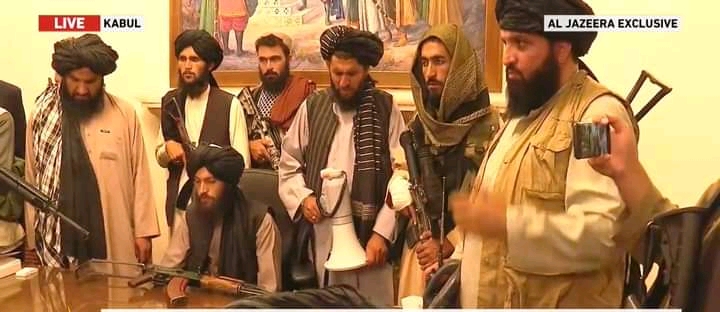
Taliban refers to students in Pashto. The Pashto language belongs to the Pashtun ethnic group in Afghanistan, where the Taliban originated from.
The border that the English created more than 100 years ago in Afghanistan runs through the Pashtun territory, separating it between southern Afghanistan and northern Pakistan. The Taliban are Pashtun and have a homeland in Afghanistan and Pakistan.
Afghanistan has several ethnic groups, but the 2004 constitution recognizes only 14 ethnic groups:
- Pashtun.
- Tajik.
- Hazara.
- Uzbek.
- Baloch.
- Turkmen.
- Nuristani.
- Pamiri.
- Arab.
- Gujar.
- Brahui.
- Qizilbash.
- Aimaq.
- Pashai. The Afghanistan’s population is 99.7% Muslim (Sunni 84.7 – 89.7%, Shia 10 – 15%), other 0.3% (2009 est.) This means that all the 14 ethnic groups in Afghanistan are all Muslims with Pashtun ethnic group as the majority as well as the economic backbone of the country with the majority of the mineral deposit in the Pashunistan region of the country. The Taliban is therefore not a religious fundamentalism, but rather ethnic nationalism.
- What Kind of Government Do Afghans Want?According to a survey by the Afghan Institute for Strategic Studies, the Taliban and the majority of the people in Afghanistan want an Emirate System because the current regime’s legitimacy has been drastically affected by flawed elections, weak governance, and corruption. But the government and its partners (U.S., U.K.) want electoral democracy to continue in the country under the presidential system, where the President controls the wealth and resources of the country.
- Whilst the government and its partners (US and UK) seek to maintain the current electoral system as the main mechanism for the distribution and balance of power, over 80 percent of the people of Afghanistan say that they support and endorse a return of the Taliban’s Emirate system and against a political regime where the Head of State is directly involved in the distribution of wealth and resources of the country.
Furthermore, they are against the claim of the government, referring to the constitution, and itself as the sovereign authority in the country, one that is directly elected by the people and therefore represents the nation and abolishing regional power.
By contrast, the people supported the Taliban brand of Islamic Emirate system, which is principally a regional system of government ruled by Islamic laws, as “the Islamic solution” to the country’s problems as well as women’s rights and liberties, social equality, and freedom of expression.
The Taliban, highlighting the government’s ineffectiveness in both governance and law enforcement in the past two decades, advertises its Islamic emirate as a religious-political entity that represents God’s sovereignty on earth and therefore an acceptable rule for the Muslim nation and against the control of the regional mineral resources by the Federal Government of Afghanistan.
This observation shows that due to the country’s ethnic structure, democratic values and processes are foreign and not supported by the Afghan people. The people of Afghanistan supported the Taliban’s Emirate system and refuse an electoral democracy. Ethnic regionalism has finally taken hold in Afghanistan.
Where does the Taliban get their weapons?
The bulk of the money for arms comes from opium production, drug trafficking, kidnapping and natural resource extraction. Drugs alone filled their coffers with $450 million and added to everything else, and they went up by $1.5 billion a year.
They purchased arms in Pakistan, Russia and Iran. And get Saudi Arabia’s financial backing. They also obtained arms from those left behind by the US.
The Afghan troops who surrendered to the Taliban were also Taliban themselves working as spies and compromising the security of the United States. This was an untenable war for the American people. The driving force of the Taliban is their ethnic nationalism and not religious fundamentalism, as all ethnic groups in the country are Muslims.